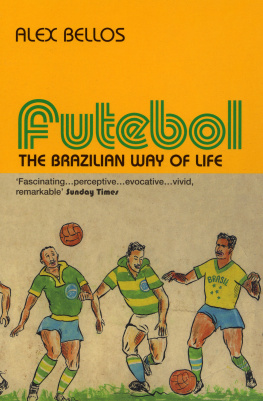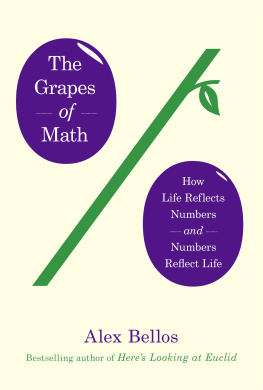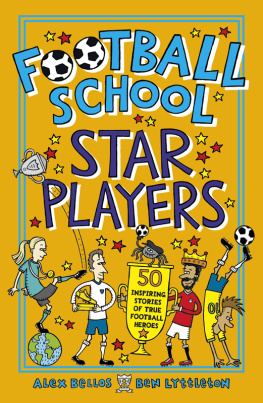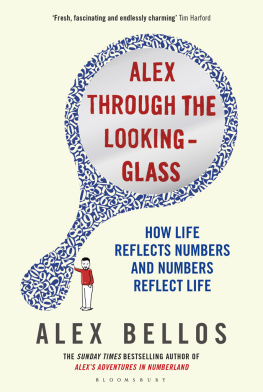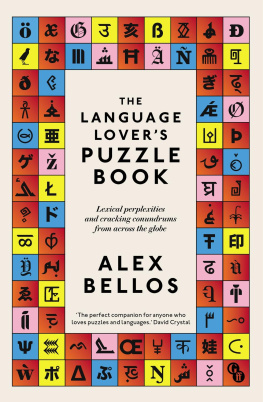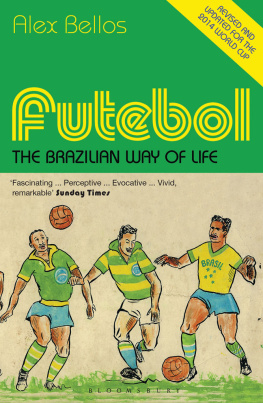Alex Bellos - Futebol: The Brazillian Way of Life
Here you can read online Alex Bellos - Futebol: The Brazillian Way of Life full text of the book (entire story) in english for free. Download pdf and epub, get meaning, cover and reviews about this ebook. year: 2002, publisher: Turtleback Books, genre: Detective and thriller. Description of the work, (preface) as well as reviews are available. Best literature library LitArk.com created for fans of good reading and offers a wide selection of genres:
Romance novel
Science fiction
Adventure
Detective
Science
History
Home and family
Prose
Art
Politics
Computer
Non-fiction
Religion
Business
Children
Humor
Choose a favorite category and find really read worthwhile books. Enjoy immersion in the world of imagination, feel the emotions of the characters or learn something new for yourself, make an fascinating discovery.
- Book:Futebol: The Brazillian Way of Life
- Author:
- Publisher:Turtleback Books
- Genre:
- Year:2002
- Rating:5 / 5
- Favourites:Add to favourites
- Your mark:
- 100
- 1
- 2
- 3
- 4
- 5
Futebol: The Brazillian Way of Life: summary, description and annotation
We offer to read an annotation, description, summary or preface (depends on what the author of the book "Futebol: The Brazillian Way of Life" wrote himself). If you haven't found the necessary information about the book — write in the comments, we will try to find it.
Futebol: The Brazillian Way of Life — read online for free the complete book (whole text) full work
Below is the text of the book, divided by pages. System saving the place of the last page read, allows you to conveniently read the book "Futebol: The Brazillian Way of Life" online for free, without having to search again every time where you left off. Put a bookmark, and you can go to the page where you finished reading at any time.
Font size:
Interval:
Bookmark:
Futebol
THE BRAZILIAN WAY OF LIFE
ALEX BELLOS
BLOOMSBURY
First published in Great Britain 2002
Copyright Alex Bellos
This electronic edition published 2009 by Bloomsbury Publishing Plc
The right of Alex Bellos to be identified as the author of this work has been asserted by him in accordance with the Copyright, Designs and Patents Act 1988
All rights reserved. You may not copy, distribute, transmit, reproduce or otherwise make available this publication (or any part of it) in any form, or by any means (including without limitation electronic, digital, optical, mechanical, photocopying, printing, recording or otherwise), without the prior written permission of the publisher. Any person who does any unauthorised act in relation to this publication may be liable to criminal prosecution and civil claims for damages.
Bloomsbury Publishing Plc, 36 Soho Square, London W1D 3QY
A CIP catalogue record for this book is available from the British Library
eISBN: 978-1-40880-722-4
www.bloomsbury.com/alexbellos
Visit www.bloomsbury.com to find out more about our authors and their books. You will find extracts, authors interviews, author events and you can sign up for newsletters to be the first to hear about our latest releases and special offers.
For Ella
CONTENTS
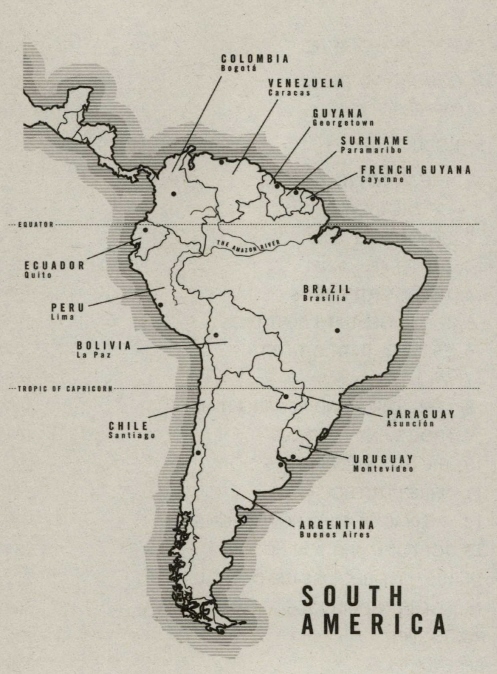
I am absolutely enchanted in all senses of the word by passion. It is what guides us through the unknown like an experienced commander; angry seas never scare us when we face them with the madness of love. Of all nations, none has a people that loves and falls in love more than mine. We are surrounded by exaggeration, happiness, spontaneity and creation. The expression of hope on our faces is the trademark even of those who have never received the tiniest advantages of society. We devotedly believe in the new world and in the beautiful humanity we know we will construct, without the muzzle that can take our freedoms away or the whips that try to frighten us. Without the ignorance that would lead us to the stupor of an empty cocoon.
Our populace that was born enslaved frees itself every day with a soaring voice in search of the truth. Its truth. That which bases its strength in an irremovable culture because it comes from the soul, from the aura, from the smile, and where whites and Indians, blacks and the poor, migrants and the young delight in lifes pleasures. And what pleasures! A people who know what they really want even though they dont recognise how. Or do they?
The answers that we search for require special care and attention.
We are a people of a thousand faces and gestures. A people fighting to preserve our history against everything and against all the evidence and possibilities. A shrewd, vain and happy people who make good use of our natural wonders with the naturalness of the carefree. A people who love everything around them and who know how to extract the wisdom of a lifetime from every second. And a people who love football.
Football is a sport made from spontaneity and discernment, luxury and freedom, and one that, I believe, is part of our most primitive genome, like dance. But football should also be a type of dance. A dose of peace.
Alex Bellos, with the characteristic patience of a sage and the charmed curiosity of a scientist, shows us, with irrefutable clarity, our face and our soul. Just like a life theatre in which we watch and discuss our daily lives without getting involved with its banality, our enchanted and enchanting neobrazilian travels across our immensity to discover who we are and why we are. And achieves this, with discernment and a rare sensibility.
I researched and wrote this book in the two year run-up to the 2002 World Cup finals. It was an event that Brazilians feared as much as they looked forward to. With the national team having qualified by the skin of its teeth, the signs were that Korea and Japan would be the stage for international humiliation confirmation that the beautiful game was dead. Instead, Brazil were champions. From being the year of crisis, 2002 became the crowning year of Brazilian supremacy. In reaching their third consecutive World Cup final the team had gone one better than the team of Pels generation. The victory meant that Brazil became the only nation to win the World Cup five times two trophies more than their nearest rivals. It was both the worst and the best of times.
Instead of changing the main text to make reference to the 2002 World Cup, any updates have been left to a short postscript at the end of chapters, and the appendices. The statistics may have changed, but the country stays the same.
Rio de Janeiro
December 2002
Football arrived in Brazil in 1894. The violent British sport did unexpectedly well. Within decades it was the strongest symbol of Brazilian identity. The national team, as we all know, has won more World Cups than anyone else. The country has also produced Pel, the greatest player of all time. More than that, Brazilians invented a flamboyant, thrilling and graceful style that has set an unattainable benchmark for the rest of the world. Britons call it the beautiful game. Brazilians call it futebol-arte, or art-football. Whichever term you choose, nothing in international sport has quite the same allure.
I arrived in Brazil in 1998. I didnt do badly, either. I became a foreign correspondent. It was a job Id always coveted and, journalistically speaking, Brazil is irresistible. The country is vast and colourful and diverse. Among its 170 million population there are more blacks than any other country except Nigeria, more Japanese than anywhere outside Japan, as well as 350,000 indigenous Indians, including maybe a dozen tribes who have not yet been contacted. Brazil is the worlds leading producer of orange juice, coffee and sugar. It is also an industrialised nation, curiously one of the worlds leading aeroplane-makers, and it has an impressive artistic heritage, especially in music and dance.
And, of course, theyve got an awful lot of football.
Soon after I arrived I went to see the national team play. It was at the Maracan, the spiritual home of Brazilian ergo world football. When the players filed on to the pitch, we jumped and cheered. The noise was like an electric storm, a rousing chorus of firecrackers, drumming and syncopated chants. It crystallised what I already knew; that the romance of Brazilian football is much more than the beautiful game. We love Brazil because of the spectacle. Because their fans are so exuberantly happy. Because we know their stars by their first names as if they are personal friends. Because the national team conveys a Utopian racial harmony. Because of the iconic golden yellow on their shirts.
We love Brazil because they are Braziiiiiiiiiil.
As a sports fan, I immediately took an interest in the domestic leagues. I read the sports pages, adopted a club and regularly went to matches. Following football is perhaps the most efficient way to integrate into Brazilian society.
As a journalist, I became increasingly fascinated with how football influences the way of life. And if football reflects culture, which I think it does, then what is it about Brazil that makes its footballers and its fans so well Brazilian.
Thats what this book is about.
I first wanted to know how a British game brought over a little over a century ago could shape so strongly the destiny of a tropical nation. How could something as apparently benign as a team sport become the greatest unifying factor of the worlds fifth-largest country? What do Brazilians mean when they say, with jingoistic pride, that they live in the football country?
Next pageFont size:
Interval:
Bookmark:
Similar books «Futebol: The Brazillian Way of Life»
Look at similar books to Futebol: The Brazillian Way of Life. We have selected literature similar in name and meaning in the hope of providing readers with more options to find new, interesting, not yet read works.
Discussion, reviews of the book Futebol: The Brazillian Way of Life and just readers' own opinions. Leave your comments, write what you think about the work, its meaning or the main characters. Specify what exactly you liked and what you didn't like, and why you think so.

